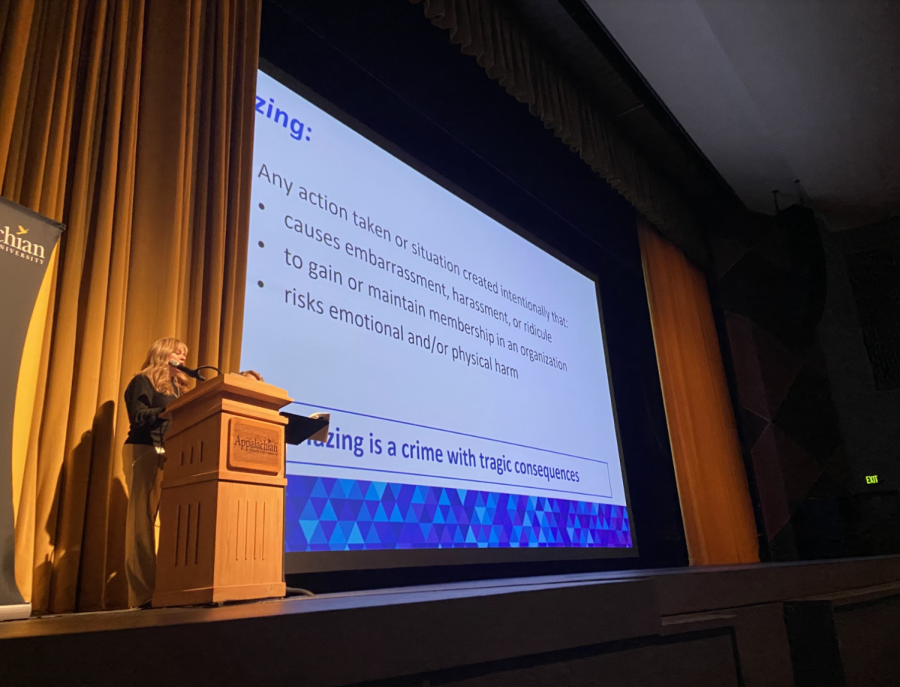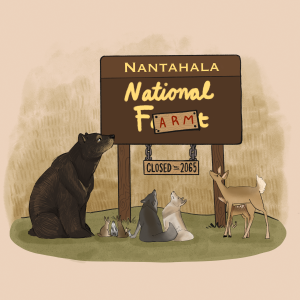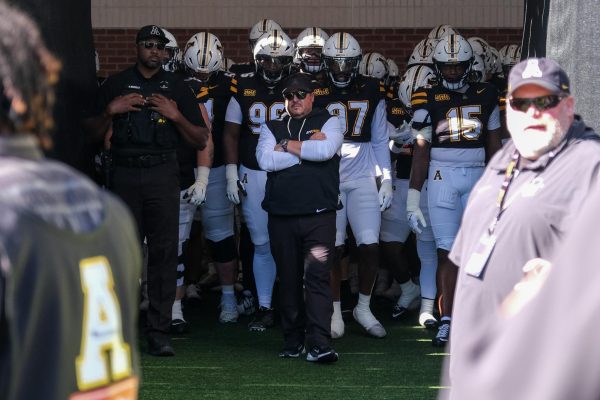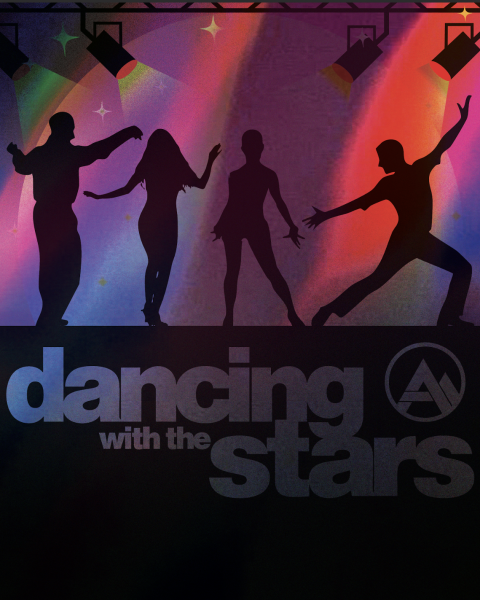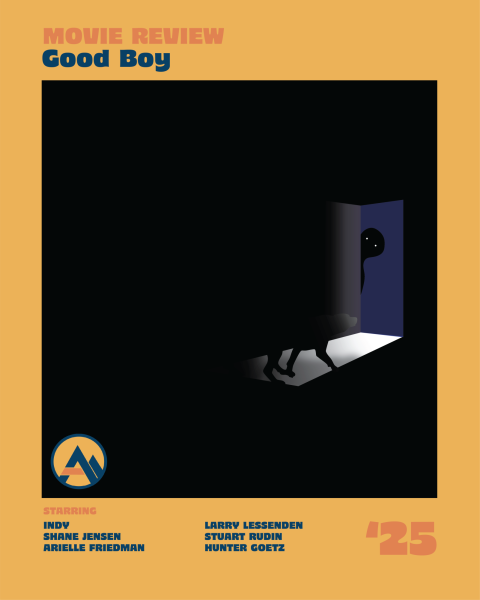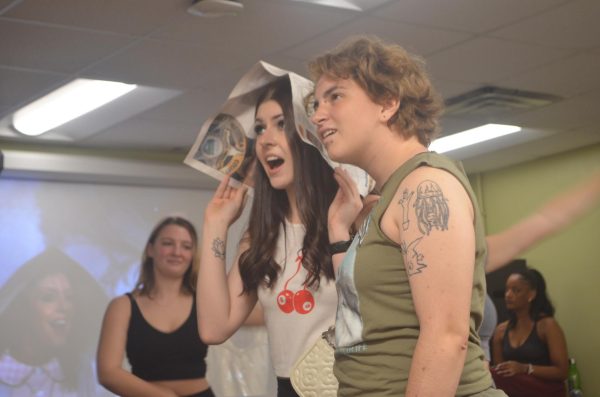Love, Mom and Dad program calls for anti-hazing movement
Kathleen Wiant speaks to the audience about hazing and what hazing looks like.
March 1, 2023
App State hosted a program Tuesday night called Love, Mom and Dad that encouraged anti-hazing actions and touched on the lasting impacts of hazing for App State students in fraternities and sororities.
The program was held in the Schaefer Center for the Performing Arts with over 100 students in attendance. It was delivered by mothers Evelyn Piazza and Kathleen Wiant, who lost their sons in college hazing incidents in 2017 and 2018, respectively.
Tim Piazza lost his life after sustaining injuries from falling down a flight of stairs when he was hazed with alcohol at his fraternity, Beta Theta Pi of Penn State University. Collin Wiant died from a hazing incident caused by inhaling nitrous oxide at his fraternity, Sigma Pi of Ohio State.
Evelyn Piazza and Kathleen Wiant said their sons were in the process of pledging at their fraternities where they were both repeatedly hazed.
“He was a great friend, brother and boyfriend,” Evelyn Piazza said to the audience when describing her son.
Kathleen Wiant said she remembers her son by his smile.
“Collin had this really warm, genuine smile. And when you walked into the room, you could feel his energy, you could feel his smile,” Kathleen Wiant said.
The mothers told stories about their sons, their deaths and presented ways to prevent hazing.
“I want you to put yourself in our shoes,” Evelyn Piazza said.
The presenters defined hazing as anything created intentionally to cause embarrassment, harass or ridicule someone in order to gain or maintain membership to an organization. Hazing risks emotional or physical harm to the person it is being inflicted on.
The mothers then talked about some misconceptions associated with hazing.
Kathleen Wiant said she never would have thought her son would fall victim to hazing.
“He was always someone who stood up for himself. He always stood up for the underdog,” Kathleen Wiant said.
The mothers said hazing starts off small and harmless, such as one member asking another to do their laundry, or carrying around a brick with them everywhere they go.
From there, the hazing becomes more evident, eventually becoming dangerous and sometimes life-threatening.
Additionally, the pair said hazing can occur outside of fraternities and sororities, such as athletic teams, academic groups or any other interest-oriented organization.
According to the presenters and the Anti-Hazing Coalition, at least one person dies due to hazing-related activities each year, most of which involve the consumption of alcohol. However, the parents and the Coalition say millions of people are hazed each year, and the impacts can be long-lasting, such as physical and psychological trauma.
“The negative effects of hazing can be long-lasting,” Evelyn Piazza said. “It’s abuse.”
Currently, hazing in North Carolina is considered a Class 2 misdemeanor, not a felony. After the death of their sons, the mothers advocated to strengthen anti-hazing laws, such as Collin’s Law, which better enforced anti-hazing practices and allowed for more consequences to be enacted for those associated with hazing in the state of Ohio. In some cases, the law allows for hazing to be considered a felony.
The mothers encouraged their audience to reach out to local state representatives and ask for a felony hazing law to be implemented.
“We’re not looking to send people to jail,” Evelyn Piazza said. “The objective is to create a deterrent.”
Shaleeah Smith, associate director of Campus Activities who oversees the fraternity and sorority life at App State, said hazing is against App State’s code of conduct.
Smith said the department’s goal in hosting the event was to “provide a different perspective and narrative as it relates to hazing.”
The mothers also spoke to the audience about a call to action against hazing.
Kathleen Wiant said hazing does not build long-term, healthy relationships. She and Evelyn Piazza encouraged the audience to consider safer alternatives to hazing.
“I challenge you to look and see what you can do instead of hazing,” Evelyn Piazza said.
The mothers encouraged sorority and fraternity members to call 911 immediately in the event of a hazing situation rather than seeking advice from someone within the organization or a leadership position.
“Do not try to play doctor,” Kathleen Wiant said.
The parents said North Carolina has a medical amnesty policy where the caller and the person they are calling for will be granted limited legal immunity and will not face certain repercussions.
Kathleen Wiant said she and her husband were in a sorority and fraternity while in college. She told people, “I majored in business, but I minored in sorority.”
The pair said they understand Greek life allows for connections to be built among peers.
“Part of the beauty of Greek life is you get to choose your brothers and sisters,” Evelyn Piazza said.
Evelyn Piazza said that students should look out for their Greek brothers and sisters by “putting their health, well-being and safety above all else.”
As for the impacts hazing left on the mothers, their family and friends, Evelyn Piazza said she is “in physical pain every day.”
The duo left the audience with a final message: “You could leave here tonight and say ‘you know what, we’re done with hazing,’” Kathleen Wiant said.
The presenters then answered questions submitted by audience members via Instagram.
When the program concluded, some students offered condolences to the mothers, thanking them for giving the presentation, with some even hugging the mothers and asking for photos with their organization.
Interfraternity council president Jackson Bjork said the department hosted the presentation to spread awareness to the university’s 36 fraternity and sorority chapters. Both mothers have outreach methods for students and their parents.
Evelyn Piazza can be contacted at epiazza@liveliketim.org. She has a website and foundation in her son’s memory.
Kathleen Wiant also has a website dedicated to the memory of her son, Collin Wiant. She spoke about the impacts of hazing during a TEDx Talk and released a documentary about her son titled “45 Mill Street.”

